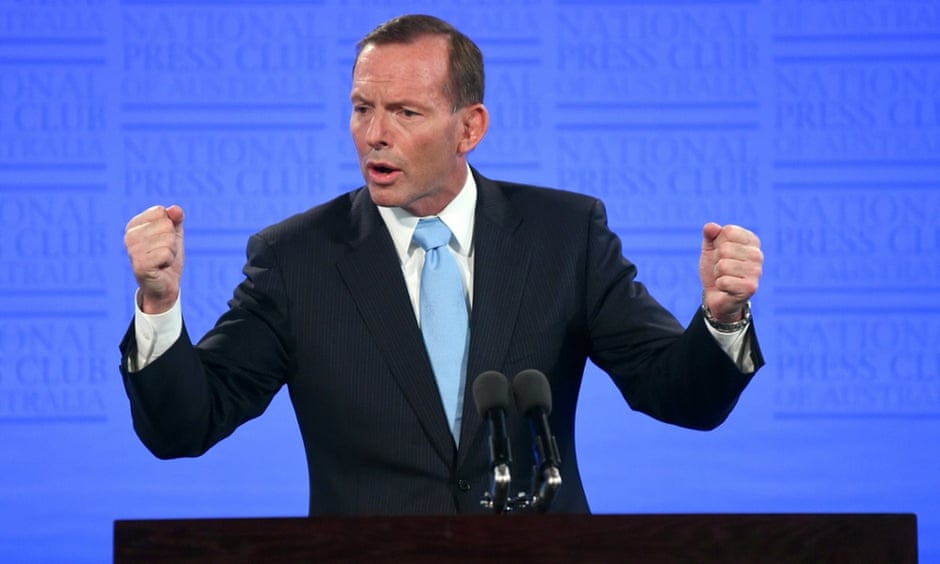The prime minister’s press club speech was most notable for what it
lacked – recognition of voters’ concerns and determination to address
them

Tony Abbott at the National Press Club in Canberra: full of resolve but
didn’t answer the real questions. Photograph: Mick Tsikas/AAP
Tony Abbott’s press club speech had little to do with charting a path forward and everything to do with circling the wagons around his prime ministership.
But a path forward – a way out of its political mess – is the only
thing that can save the prime minister and his government. Circling the
wagons might hold his critics off for a while, but it doesn’t address
the cause of their concern.
Abbott’s political message was obvious – he isn’t going anywhere.
His policy message was that he was the guy with the resolve and the
guts to tackle the budget deficit and this was crucial because not
addressing it would be “ripping off future generations” and risking
contracting the European “disease”.
But the 2014 budget didn’t actually do all that much to reduce deficits. Deficits will, over the next two years, total almost $72bn,
compared with the $28.7bn calculated by treasury and finance during
last year’s election campaign. A forecast surplus is now six, rather
than two, years away. And many of those cuts are stalled in the Senate.
Despite this, and despite the dire consequences he said would flow
from ignoring the deficit, the prime minister also argued that the 2014
budget had apparently done enough and the 2015 budget won’t contain the
same pain. “Because we have done much of the hard work already, we won’t
need to protect the commonwealth budget at the expense of the household
budget,” he maintained.
The spending cuts in last year’s budget were rejected by the
electorate because they were perceived to be unfair. Economic modelling
by the National Centre for Social and Economic Modelling (Natsem) and separate modelling by the Australian National University
showed they actually were unfair – even after the abolition of the
carbon tax was taken into account. Low-income earners were hit hardest
and high-income earners felt little pain.
That was the exact moment the Abbott government appeared to lose the
voters’ trust. And yet it has never explained why it chose that
particular combination of spending cuts to reduce the deficit and not
other, fairer ones. Instead it has been pretending that the cuts it
chose were the only ones available.
Despite conceding that the lesson of the Queensland election rout was
that governments had to “take the voters with them”, the prime minister
again refused to address this question, resorting again to the “ripping
off future generations” lines. How do you “take voters with you” if you
don’t address their main concern?
And
he effectively said Victorian voters who threw out the first-term
Liberal government last year, in an election dominated by a part
federally funded road, had made the wrong decision. The new Labor
government does not want to proceed with the road and could face a
sizeable fee for breaking a contract, which was what happened, the prime
minister quipped, when voters “in a fit of absent-mindedness” elected
Labor governments.
He confirmed he was ditching his “signature” paid parental leave
scheme – as evidence he was listening to his party’s concerns about it.
But the prime minister must be a slow listener because almost everyone
in his party has been against the scheme ever since he imposed it upon
them almost five years ago. It would be replaced by a families and
childcare package – which is indeed a better way to improve
productivity, but would earn the ire of business if the levy they were
paying to fund the paid parental leave plan is simply going to be
redirected.
He reminded us of the big changes over which the Coalition
wants to conduct a “constructive debate”. One is tax reform. But then
he said he would not consider a central element – changing the goods and
services tax – unless there was “political consensus” and all states
and territories agreed. Which isn’t going to happen.
And the big mea culpa on the Sir Duke Prince Philip disaster? One backbencher declared straight away it wasn’t adequate and vowed to introduce a private member’s bill to do away with knights and dames altogether. And several others supported him.
The point of the speech was to tell agitating backbenchers that he
would stare them down and that they were doing the country a disservice
by the very act of leadership agitation.
But it didn’t do anything to answer the underlying causes of the
government’s malaise – why the government made the specific decisions
that brought it to this point, and what it intended to do to restore
voters’ confidence.
It was full of resolve, but it didn’t answer the real questions at the heart of the government’s problems.

No comments:
Post a Comment